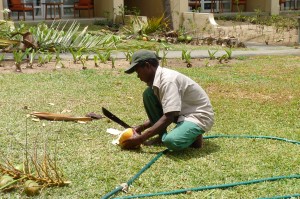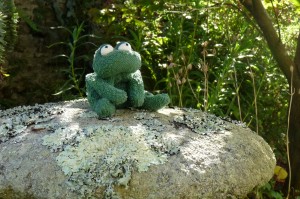SHOW NOT TELL
Anton Chekhov gave the following good advice to writers.
‘Don’t tell me the moon is shining; show me the glint of light on broken glass.’
In other words, don’t tell me, show me.
Telling’ supplies information, and, yes, sometimes this is important.
‘Showing’ draws the reader into your story, making it real for them.
‘Showing’ often uses the senses so the reader relates to your story through their own experiences.
 Here’s an example:
Here’s an example:
TELLING: Nora watches from her balcony as they prune the palm trees. She goes outside, and one of the men gives her a coconut. He prepares it for her, and tells her to go to the bar for a straw.
SHOWING: Nora watches one of the workmen from her balcony. He climbs the tall ladder, propped halfway up the tree.Then he shins up the rough bark. There is the loud smack as branches thwack the ground, and the sudden heavy plop of coconuts.  One bursts and the sweet juice splatters the grass.
One bursts and the sweet juice splatters the grass.
Nora goes outside for a closer look. The ground is covered with enormous leaves, and dozens of coconuts like marbles waiting for a giant’s children to come out to play. The man she’d watched points to one of the smooth golden fruit. She nods, and he slices the end off with his machete, tells her to go to the bar for a straw.
She wants to share this moment with Simon, but of course he’s not here. What a fool she’s been.
I think you can do much better than this, but here’s my point. Make your characters react to what happens to them. Make them feel, make them react, and, dare I say it, make them suffer before you release them.
Your writing will improve, and your readers will love you stories.
For more advice on SHOW NOT TELL, have a look at the following blog by Emma Darwin, author, tutor, mentor and editor.
Google The Itch of Writing: the blog: Showing and Telling.
You mean, I gather my pond friends around me, and I say, ‘I’m going to show you a story.’
I think the world’s gone mad!

